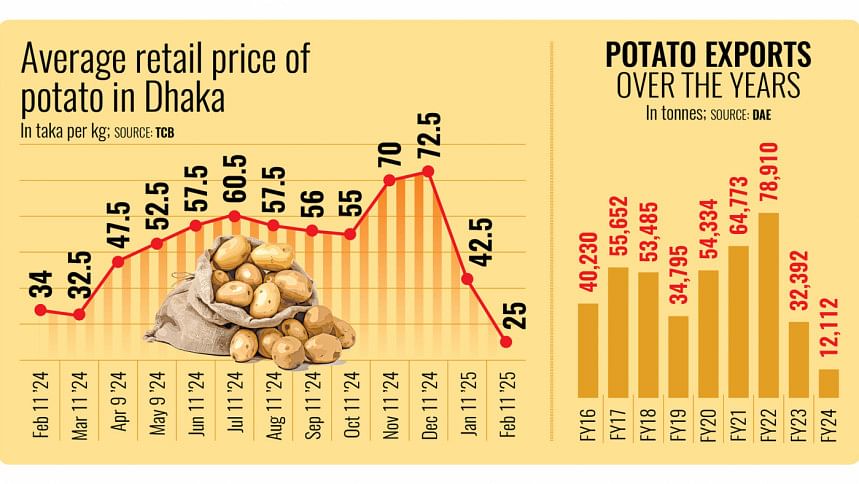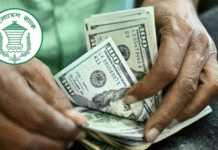
Lured by high prices during the potato planting season in November last year, farmers expanded cultivation of the tuber at an unprecedented rate this season.
According to the Department of Agricultural Extension (DAE), potato growers cultivated the starchy vegetable on a record 5.24 lakh hectares this fiscal year, up 15 percent year-on-year, hoping to capitalise on record prices, which had soared to as high as Tk 80 per kilogramme (kg) last year.
As the harvesting season has now arrived, potato farmers in major producing hubs are no longer thinking about turning a profit.
Instead, they are wondering how to survive after being forced to sell their produce below production costs due to record cultivation and the prospect of ample supply.
In Dhaka yesterday, potatoes were at Tk 20 to Tk 30 per kg in retail, the same price as a week ago, according to the state-run Trading Corporation of Bangladesh (TCB).
The situation is even bleaker elsewhere, with several farmers in Rangpur, Dinajpur, Thakurgaon, Bogura and Joypurhat reporting prices as low as Tk 11 per kg — far below the production costs, which the DAE estimated at Tk 15 per kg this season.
This has left many farmers fearing they will be unable to recoup their initial investment. They are now pinning their hopes on rising prices in the coming months or government steps to support them.
“So much land has never been dedicated to potato farming before,” Md Obaidur Rahman Mondol, director of the field service wing at the DAE, told The Daily Star.
This season, total production is expected to reach 1.20 crore tonnes, according to the Bangladesh Cold Storage Association (BCSA), a major player in the local supply chain.
The Bangladesh Bureau of Statistics (BBS) has a more moderate estimate of 1.06 crore tonnes.
Both figures are close to the 1.09 crore tonnes produced last season, according to DAE data, and surpass the country’s annual demand of around 90 lakh tonnes.
Although the government estimates that around 30 percent of total produce is lost due to shortcomings in storage facilities, this oversupply means there may be little relief for small farmers.
Anwar Hossain, a farmer from Uttar Gosaipur village in Dinajpur, recently sold potatoes at Tk 13 per kg, though his production costs reached Tk 16.60 per kg.
“My production costs rose by Tk 3 to Tk 4 per kg this year due to the excessive prices of potato seeds,” he said.
Potato seeds were at Tk 35 to Tk 40 per kg last season, but the rates increased to Tk 80 per kg during the planting period this season, which spans October to November, Hossain said.
Besides, labour costs and other agri inputs also increased, he added.
The DAE’s estimates support his claims, showing that potato production costs rose by Tk 2 per kg year-on-year, driven by higher expenses for pesticides, seeds, labour and land leasing.
Shariful Islam, a potato farmer from Sherpur upazila in Bogura, said his production costs amounted to Tk 16 to Tk 17 per kg. However, after failing to get a better offer, he had to settle for selling his produce at just Tk 11 per kg on Tuesday.
“If the losses continue to pile up, I am unsure whether I will cultivate potatoes next season,” he lamented, blaming the government for failing to control the prices of fertilisers and seeds.
Another concern is that cold storage facilities are charging around Tk 4 more per kg than last season to store potatoes.
Mazharul Islam, a potato farmer in Joypurhat, one of the country’s largest potato-producing districts, was luckier than many others.
He said he managed to break even by selling his produce at Tk 10 per kg.
“Honestly, we continue farming because we have no shame,” he said in frustration.
Md Sawkat Osman, director of the crops wing at the DAE, said production was very good this season due to favourable weather and the absence of late blight disease, leading to an oversupply. As a result, farmers are not getting their desired prices.
He believes that the drop in potato prices is temporary.
However, cold storage owners at a press conference recently claimed that retail prices of potatoes will not cross Tk 40 per kilogramme this year, citing this year’s potato production is set to surpass local demand.
Md Masud Karim, director general of the Department of Agricultural Marketing (DAM), told The Daily Star that the current prices remain unsatisfactory for farmers but hoped that they would improve in the near future.
Mohammad Emdad Ullah Mian, secretary of the Ministry of Agriculture, told The Daily Star that potato cultivation this season has crossed their projections, leading to the current situation.
However, given the nature of Bangladesh’s market system, monitoring the entire supply chain remains a highly challenging task, he added.
He said that the ministry had become aware of recent increases in cold storage rental fees and said discussions would be held to assess whether the hikes are justified.
“If storage costs rise further, it will become even more difficult for farmers,” Mian added.
He also mentioned that there is a gap in production and demand data and that steps have been taken to address this issue. Besides, the government plans to provide policy support to ensure farmers do not face such situations in the future.
Mohammad Jahangir Alam, an agribusiness and marketing professor at the Bangladesh Agricultural University, said the government should take appropriate measures to address the losses faced by farmers.

Last update on: Thu Feb 13, 2025 12:39 AM









